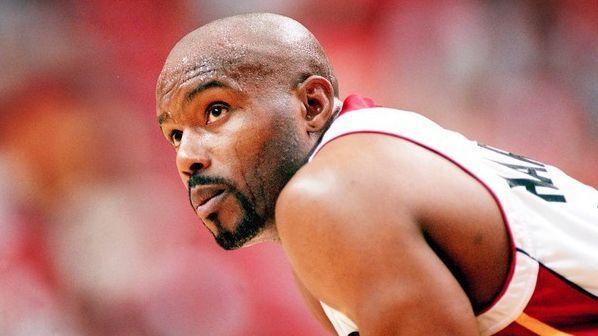
Tim Hardaway was halfway to what on Saturday formally became a Hall of Fame career, and suddenly there was question about whether he had enough remaining fight.
Enter Pat Riley, Alonzo Mourning and the Miami Heat — and immediately the gloves were off.
The rest of the story now can be told in September in Springfield, Mass., when Hardaway follows Riley and Mourning into the sport’s ultimate shrine.
“We put the Miami Heat on the map and made them what Pat Riley wanted the Miami Heat to be,” Hardaway told the Sun Sentinel from New Orleans, where on Saturday at the NCAA Final Four he formally was named to the Naismith Memorial Basketball Hall of Fame’s Class of 22. “It started when I got traded there in February in ‘96.”
That also was when Hardaway, in the wake of his Run TMC success alongside Mitch Richmond (the “M”) and Chris Mullin (the “C”), found himself benched by Golden State Warriors coach Rick Adelman, some left to wonder whether, at 29, Hardaway had run his course as an elite-tier point guard.
Enter Riley and then-Heat General Manager Randy Pfund, who saw anger that could be channeled into what would become perennial Heat playoff runs.
“That,” Hardaway said to the Sun Sentinel ahead of his media session in New Orleans, “was just the faith of Pat Riley understanding that I could still play, Pat Riley and Randy Pfund understanding that I could still play, that I had still a lot left in the tank.”
Only for all the flash and sizzle that Hardaway had displayed under his best of Warriors days under coach Don Nelson, Riley was looking more for fight and snarl.
Even now, that draws a knowing laugh from Hardaway, 55.
“That’s the way I grew up in Chicago,” Hardaway said. “That’s the way I grew up on the South Side. We get real nasty and we go out there and just play. And we can talk a bunch of stuff and still go out there and play. And when I saw I had that chance to come to Miami, I told Zo, ‘He needs to trade for me.’ And I knew what I could do.
“I can play both ways. I can play nasty, I can play mean, slap you, knock you down. So it wasn’t like I had to turn into this, I had to turn into that. It wasn’t a switch I had to turn. I was like, ‘This is cool. This is the way I play, anyway.’ This is how we play in Chicago every day. So it wasn’t new to me.”
Still, there were rough patches between the headstrong Hardaway and the demanding Riley, at one point Hardaway’s salary tied to weekly weigh-ins.
In retrospect, it was coach making strong-willed player stronger.
“I don’t think he really knew how much I had in the tank, or how good I would be once I got back in shape,” Hardaway said. “I think he was openly surprised at what I could do and how I could do it, and my basketball IQ of running his team and running his system.
“He really understood, ‘I got something here,’ and let me be the engine like Don Nelson let me run the engine at Golden State.”
Having previously been a finalist for selection, Hardaway acknowledged that his anti-gay comments during a 2007 radio interview factored in his wait.
In the interim, he made a point to not only express contrition but also work to educate others, just as he came to be enlightened.
“I’m happy that we can forgive,” he said. “I’m happy that we can give people a second chance. I think about that, and I truly do, I just don’t say this, I think about that comment every day.
“And I always want to make amends, but I also want to make a difference in people’s lives, every day. And, yes, it made me a better person. It made be a better father. It made me a better husband. I changed my outlook on a lot of things.”
()
